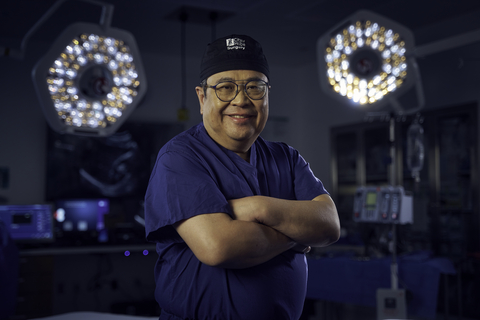Dr. Fong has surgically cured cancers once thought to be incurable, developed and tested the safety and efficacy of cancer-killing viruses in humans, and is advancing AI and robotic surgery infrastructure for the next generation of remote surgeons.
Yuman Fong, M.D., chair of the Department of Surgery at City of Hope®, one of the largest and most advanced cancer research and treatment organizations in the United States with its National Medical Center named a Top 5 “Best Hospital” in the nation for cancer care by U.S. News & World Report, this month delivered the Lister Legacy Lecture at the triennial conference of The Royal College of Surgeons of Edinburgh. This presentation honors the long-term impact of Baron Joseph Lister, M.D., who brought antiseptic techniques and many other innovations to surgery, saving more lives and making a real difference in how patients live.
This press release features multimedia. View the full release here: https://www.businesswire.com/news/home/20250625050542/en/

City of Hope's Dr. Yuman Fong has surgically cured cancers once thought to be incurable, developed and tested the safety and efficacy of cancer-killing viruses in humans, and is advancing AI and robotic surgery infrastructure for the next generation of remote surgeons.
“I am humbled to have been asked to speak on ‘The Surgeon in the 21st Century.’ Sir Joseph Lister’s work with antiseptics laid the foundation for the sterile surgical practices we rely on today. His forward-looking mindset has inspired me to collaborate with doctors and med-tech companies around the world to push the boundaries of surgical innovation.
“At City of Hope, we are exploring the use of AI and robotics in research settings to make it one day possible for specialists to perform remote surgery together. The goal is to make exceptional cancer surgery available to everyone — no matter where they live or how close they are to a major cancer center,” said Dr. Fong, City of Hope’s Sangiacomo Family Chair in Surgical Oncology.
The Royal College of Surgeons of Edinburgh is one of the oldest surgical colleges in the world and is where the father of modern surgery, Dr. Joseph Lister, worked for much of his career as a general surgeon, pathologist and medical scientist. Before Dr. Lister’s pioneering work in antiseptics, people were just about ready to give up on surgery altogether because infections were killing so many patients. Dr. Lister is still on people’s lips today; the popular mouthwash Listerine was named in honor of him.
Dr. Fong Is Curing Stage 4 Colorectal Cancer
Metastatic colorectal cancer that has spread to the liver was once considered incurable. Dr. Fong is known internationally for his expertise in liver surgery and for proving that liver resection sometimes can cure Stage 4 colorectal cancer. In fact, he devised a new scoring system called the Fong Score that is widely used in staging for this population of patients, allowing surgeons to plan a path toward surgical cure.
Along the journey to less invasive liver therapies, Dr. Fong has contributed to the design and deployment of many new minimally invasive surgical and interventional tools that are used worldwide. More recently, Dr. Fong led a team that demonstrated robotic liver surgery can safely and routinely be performed as outpatient surgery.
The Next Generation of Gene Therapy
Dr. Fong has focused on gene therapy for over two decades, engineering viruses and immune cells to kill cancer. His City of Hope team developed CF33, a cancer-fighting virus that has been shown to shrink colon, lung, breast, ovarian and pancreatic cancer tumors in preclinical laboratory and animal models.
Importantly, CF33 wakes up the immune system to join the fight. There are many ongoing multisite clinical trials to evaluate the safety and efficacy of investigational solid and blood cancer therapies based on Dr. Fong’s CF33 technology*.
Leveraging AI and Wearables to Improve Patient Outcomes
Immunotherapies are making more cancers that were previously inoperable operatable. Minimally invasive robotic surgery has turned surgeons into superheroes with computer-aided vision sometimes powered by augmented reality (AR) for a clearer, more interactive view of what’s happening inside the body. AR is enabling remote surgery and multispecialty collaboration where surgeons in different locations can work together in real time guided by shared visualizations and data overlays. Remote surgery is still undergoing preclinical testing, though it promises to be a powerful tool in emergency settings when access to top specialists is limited.
AI-guided robotic systems are being tested as assistants in complex cancer surgery that can one day decrease the risk of surgical complications. For example, AI could predict how tissue will move and designate “no go zones” where snips should not occur. In the future, some simple surgical tasks can be automated under the supervision of experienced surgeons, increasing patient safety as well as improving working conditions for surgeons who often have long operating room schedules.
Additionally, Dr. Fong and his team are testing how wearables or remote monitoring devices can be leveraged before and after surgery to improve patient outcomes. For example, City of Hope has a $7 million funding award from the Patient-Centered Outcomes Research Institute (PCORI) to study how physical activity before and after surgery affects recovery in an older patient population.
“City of Hope is fast-tracking promising laboratory research into clinical trials. We incubate the next generation of cancer therapies on our campuses in Los Angeles and Orange County and look forward to one day offering these innovative investigational therapies to patients who come to our nationwide locations in Arizona, Illinois and Georgia and beyond,” Dr. Fong said.
* City of Hope exclusively licensed patent rights covering CF33 to Imugene Limited. Dr. Fong has the rights to commercialization revenue from the company and is a paid member of Imugene Limited’s scientific advisory board.
About City of Hope
City of Hope's mission is to make hope a reality for all touched by cancer and diabetes. Founded in 1913, City of Hope has grown into one of the largest and most advanced cancer research and treatment organizations in the United States, and one of the leading research centers for diabetes and other life-threatening illnesses. City of Hope research has been the basis for numerous breakthrough cancer medicines, as well as human synthetic insulin and monoclonal antibodies. With an independent, National Cancer Institute-designated comprehensive cancer center that is ranked a Top 5 “Best Hospital” in the nation for cancer care by U.S. News & World Report at its core, City of Hope’s uniquely integrated model spans cancer care, research and development, academics and training, and a broad philanthropy program that powers its work. City of Hope’s growing national system includes its Los Angeles campus, a network of clinical care locations across Southern California, a new cancer center in Orange County, California, and cancer treatment centers and outpatient facilities in the Atlanta, Chicago and Phoenix areas. City of Hope’s affiliated group of organizations includes Translational Genomics Research Institute and AccessHopeTM. For more information about City of Hope, follow us on Facebook, X, YouTube, Instagram and LinkedIn.
View source version on businesswire.com: https://www.businesswire.com/news/home/20250625050542/en/
Contacts
Letisia Marquez
626-476-7593
lemarquez@coh.org





